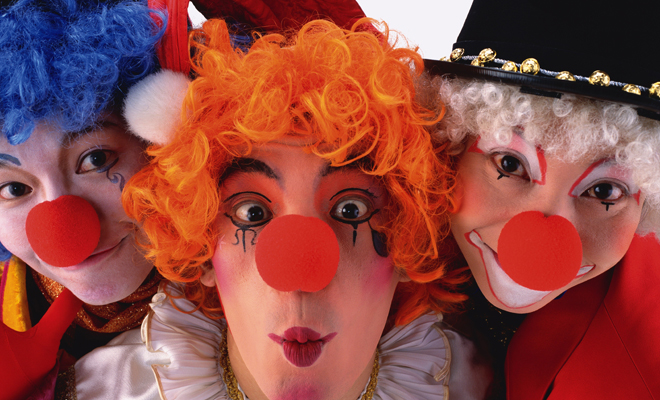If there is something in the world capable of arousing very diverse emotions and sensations in people, it is clowns. While some associate them with fun and tender childhood moments, others cause real panic. This last group represents a very small percentage of the population, but in this small number of people the figure of the clown can arouse very negative and unpleasant feelings to the point of becoming a real nightmare for them.
This irrational fear of clowns has a name: coulrophobia. It is one of the most common phobias and in this article we are going to explain what it consists of, what its causes and symptoms are and, most importantly, how it can be overcome. If you have ever suffered or suffer from this type of fear, pay close attention because what we tell you next will interest you and the world.
Coulrophobia: why am I afraid of clowns?
If you are one of those who enjoyed watching a clown animate birthday parties as a child, this fear will probably seem inexplicable to you. But the reality is that it exists and affects more people than you can imagine. Coulrophobia or fear of clowns is closely linked to latent emotional causes in the subconscious of the person who suffers from it. Due to this, there is no specific treatment that is capable of curing this phobia in a simple way, although it is true that there are psychological techniques and methods that help those who suffer from this fear with a good improvement result.
What are the symptoms of clown phobia?
The main visible symptoms in people who suffer from clown phobia are panic, anguish and fear in the presence or image of one of these subjects. It is common for this fear to be perceived as something ridiculous or funny by third parties around, however, the person who experiences coulrophobia may present severe anxiety attacks. Other symptoms associated with this pathology are the following:
Feeling of intense fear
The truth is that clowns do not represent any danger to life or survival, however people with coulrophobia perceive the opposite, experiencing extreme terror when they find themselves in front of or think of one of them.
Tremors and anxiety
In the presence of a clown, the most common thing is that people with coulrophobia cannot contain their nerves, which causes their muscles to end up tensing. In the worst cases, this irrational panic can lead to a picture of severe anxiety.
Tachycardia and sensation of irregular heartbeat
The heart of people who suffer from coulrophobia races just thinking about the presence of a clown before them.
Shortness of breath
Dyspnea is the feeling of lack of air or difficulty breathing and is one of the most common symptoms of those who suffer from clown phobia.
Causes of fear of clowns
- The causes of clown phobia are very varied and each specific case is different. It is common for most people who suffer from this type of fear to have experienced negative personal experiences around the figure of clowns. However, experts and clinical psychologists point out that the fundamental cause of coulrophobia has its origin in the collective imagination created by the media (television, press, cinema, series…) in relation to the world of clowns.
- Normally, the figure of clowns is used in horror movies as a technique to cause panic in the viewer. In this way, film directors generate a highly gimmicky cognitive dissonance, using a subject assiduously linked to entertainment and fun as the complete opposite: a disturbed man capable of killing anyone who gets in his way.
- Mental health professionals also agree that another of the main causes of clown phobia is due to the makeup used to characterize them: bright colors, huge eyes and smiles, red nose… All these elements generate remarkable stimuli. in the brain of children, causing them real fear. This is the same reaction that is triggered when some little ones get scared by sitting on Santa’s lap, for example.
- Consequently, the phobia of clowns may have one of its foundations in the mistrust caused by an exaggeratedly made-up face, which does not allow a glimpse of the true facial expression of these characters.
Is there a cure for clown phobia?
- Many parents who see that their children have a strong fear of clowns choose to avoid situations where the child could meet one of them, such as birthday parties. This may seem like an effective measure in the short term, but the truth is that clowns can appear at the most unexpected moment and in very different areas.
- The best treatment to overcome this phobia is to consult a professional in psychotherapy who will prepare a good diagnosis appropriate to the specific case of each of the patients.
- Some of the most used techniques to combat coulrophobia usually include psychological therapies which use habituation to get people terrified of clowns to gradually make contact with the causes of their fear. In this way, the bad sensations are progressively reduced until they disappear.
- The first sessions of psychotherapy based on desensitization usually consist of discussion and reflection on the phobia. Subsequently, you begin to see images related to the object of fear: clowns. The professional will determine that the treatment has taken effect when the patient is able to feel comfortable and without experiencing any of the symptoms of coulrophobia, even in the presence of clowns in the same room.
- The desensitization process allows people with a fear of clowns to gradually become familiar with their phobia until they are finally desensitized to it. In this case it can be stated emphatically that the patient has overcome it.
- Do you have a clown phobia or do you know someone who does?
